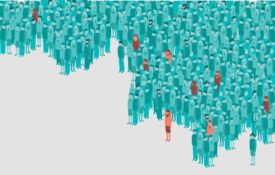-
Disinformation Is the Real Threat to Democracy and Public Health
Disinformation is the coin of the modern realm. Vaccine denial, climate denial, election denial and war-crime denial have joined the grotesque denial of the Holocaust in the ranks of dishonesties now regularly foisted on the public. We can, however, do something about this crisis of the information age. In January the World Economic Forum (WEF) ranked the spread of misinformation among the greatest threats to humanity in its Global Risks Report. With more than four billion people voting in the upcoming 2024 elections (roughly half the world’s population), the report makes clear that now is the time to prepare the world against disinformation and those who peddle it. ...
-

People Are Inclined to Hide a Contagious Illness While Around Others, Research Shows
A startling number of people conceal an infectious illness to avoid missing work, travel, or social events. Novel approaches beyond relying on individual good will may be needed to mitigate these harmful concealment behaviors.
-

Information Avoidance in the Modern Age
Podast: Özge G. Fischer-Baum and Jeremy Foust (Kent State University) dive into information avoidance and the factors that impact it, as well as how social media has affected the ways we take in information.
-
Can We Keep Time?
It can be tough to face our own mortality. Keeping diaries, posting to social media, and taking photos are all tools that can help to minimize the discomfort that comes with realizing we have limited time on Earth. But how exactly does documenting our lives impact how we live and remember them? In this episode, diarist and author Sarah Manguso reflects on the benefits and limitations of keeping track of time, and Charan Ranganath, a professor of psychology and researcher at the UC Davis Center for Neuroscience, discusses what research reveals about how memories work and how we can better keep time.
-
Does your ‘love language’ really matter? Scientists are skeptical.
If you have ever contemplated ways to improve your romantic relationships, you have probably heard about love languages. Love language, a theory about how people express and receive love, was introduced 30 years ago by Baptist pastor Gary Chapman. The notion that we all speak a love language has become so entrenched in public consciousness that it has spawned memes, satire and even a song by Ariana Grande. But some scientists are questioning the validity of the concept. And others have suggested, that in some situations, love language thinking can do harm, encouraging adherents to stay in difficult or even abusive relationships.
-
Nancy E. Adler, Who Linked Wealth to Health, Dies at 77
Nancy E. Adler, a health psychologist whose work helped transform the public understanding of the relationship between socioeconomic status and physical health, died on Jan. 4 at her home in San Francisco. She was 77. The cause was pancreatic cancer, her husband, Arnold Milstein, said. Dr. Adler was instrumental in documenting the powerful role that education, income and self-perceived status in society play in predicting health and longevity. Today, the connection is well known — a truism among public health experts is that life expectancy is determined more by your ZIP code than your genetic code. But it was an obscure notion as recently as 30 years ago.

